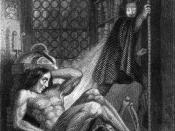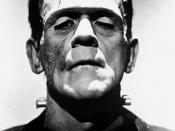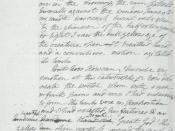One approach to this question would be to say that the creature in 'Frankentein' was himself the only monster. However, as we soon realise, the creature is benevolent at heart and only becomes monstrous due to the unjust way in which society treats him. The bleak, miserable world which Shelley portrays, full of hypocrisy, oppression and prejudice gains exposure through the depiction of the monsters 'fall from grace'. It is through the monsters suffering that he becomes truly monstrous. Shelley is suggesting that the creature's misdeeds are caused by the enormity of his suffering; at heart, he is essentially good. And, more importantly, essentially human. If he is monstrous, no one but Frankenstein is to blame. When the outraged creature demands of his creator, 'How dare you sport thus with life?' the question succinctly represents the sentiments of the reader, and perhaps even of the author as well. Frankenstein, in his hypocrisy, longs to murder a being who owes its life to him.
If the creature is, paradoxically, both inherently good and capable of evil, then his creator is as well. The main cause of the monster's suffering rests with none other than Victor Frankenstein himself, whose actions at the monster's birth were surely monstrous also. To desert a newborn child is to defy one of the most fundamental elements of human nature. This shows Victor to be inhumane, and hence, monstrous. It is this inner monstrosity that is reflected in the creature's hideous visage. This exposes one of the novels key themes; Frankenstein is the monster's double. It becomes clear at this point that Shelley is making use both meanings of the word monster. In modern usage, the term 'monster' has come to mean 'something frighteningly unnatural of huge dimensions'. However at the time of 'Frankenstein's' writing its meaning...



Good!
Very in depth, and extremely helpful! Obviously researched it quite a bit, so well done for your efforts and thanks!
1 out of 1 people found this comment useful.